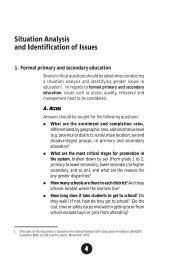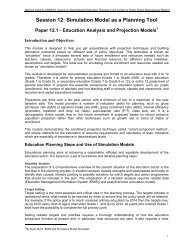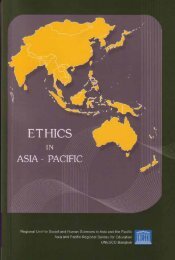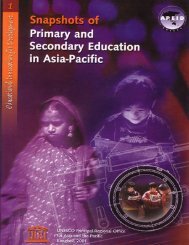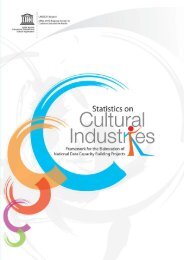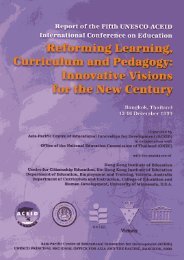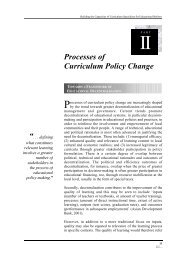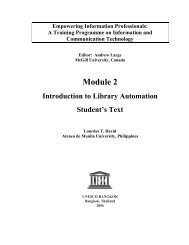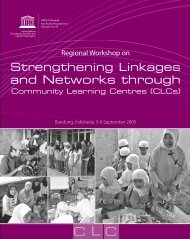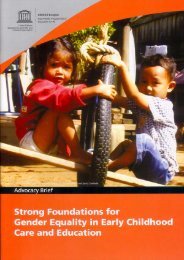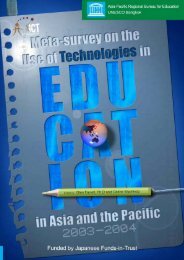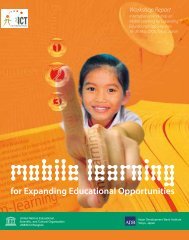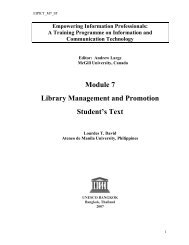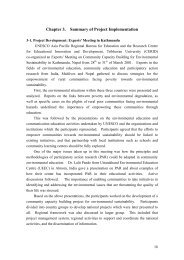Educational Finance in Thailand - UNESCO Bangkok
Educational Finance in Thailand - UNESCO Bangkok
Educational Finance in Thailand - UNESCO Bangkok
Create successful ePaper yourself
Turn your PDF publications into a flip-book with our unique Google optimized e-Paper software.
F<strong>in</strong>al Report, Volume II/3 Anthony. Cresswell: <strong>Educational</strong> <strong>F<strong>in</strong>ance</strong> <strong>UNESCO</strong>-PROAP TA 2996-THA<br />
Education Management and <strong>F<strong>in</strong>ance</strong> Study July 1999<br />
fund<strong>in</strong>g for special projects to improve school facilities and programs. If a school<br />
is seen as mov<strong>in</strong>g up <strong>in</strong> reputation, due to such improvements, teachers are more<br />
likely to seek transfers there. Changes <strong>in</strong> budget and f<strong>in</strong>ance policies could<br />
provide fund<strong>in</strong>g and discretion for f<strong>in</strong>ancial <strong>in</strong>centives for <strong>in</strong>dividual teachers as<br />
well as special development funds to make remote school more desirable. This<br />
could reduce the maldistribution of teachers as well as result <strong>in</strong> overall quality<br />
improvements <strong>in</strong> disadvantaged schools.<br />
i. If local school officials were given the authority to determ<strong>in</strong>e teacher and other<br />
staff salaries, their budget discretion, and ability to achieve <strong>in</strong>creases <strong>in</strong> efficiency<br />
would also grow considerably. This was po<strong>in</strong>ted out <strong>in</strong> <strong>in</strong>terviews with primary<br />
school pr<strong>in</strong>cipals <strong>in</strong> particular. One school, for example, was us<strong>in</strong>g two teachers<br />
receiv<strong>in</strong>g full teach<strong>in</strong>g salaries for clerical and low-level adm<strong>in</strong>istrative duties.<br />
These were the only staff available to the pr<strong>in</strong>cipal for these tasks. The teachers<br />
were already allocated to the school, and she did not have the discretion to use<br />
their salaries to hire lower paid workers, free<strong>in</strong>g up funds for other uses. This was<br />
clearly an <strong>in</strong>efficient use of resources, and had a negative impact on the morale of<br />
the teachers as well. Such <strong>in</strong>efficiencies are unavoidable when local<br />
adm<strong>in</strong>istrators have no control of such key resources. More efficient use of<br />
resources could also help improve school facilities, programs, and other amenities,<br />
mak<strong>in</strong>g, result<strong>in</strong>g <strong>in</strong> schools more desirable places to work.<br />
2.2. Government expenditure issues<br />
a. <strong>Educational</strong> support is clearly a high priority for the Government, both <strong>in</strong> terms<br />
of expenditure levels and <strong>in</strong> national plann<strong>in</strong>g. This fact does not, however, settle<br />
the issue of whether support levels are sufficient. This section explores the<br />
evidence related to the question of whether the Royal Thai Government is<br />
spend<strong>in</strong>g enough on education. That questions is explored <strong>in</strong> terms of current<br />
plans and goals, comparisons with other countries, and what appear to be press<strong>in</strong>g<br />
needs grow<strong>in</strong>g out of the economic crisis and plans for economic recovery.<br />
b. The overall conclusion reached from the exploration is that <strong>in</strong> the aggregate<br />
Government f<strong>in</strong>ancial support for education is adequate by some standards, but<br />
not by others. Total government spend<strong>in</strong>g for education <strong>in</strong> <strong>Thailand</strong> is comparable<br />
to other countries <strong>in</strong> the region, and is not low <strong>in</strong> terms of wider <strong>in</strong>ternational<br />
comparisons. F<strong>in</strong>ancial allocations among levels of education and across various<br />
types of expenditure are largely sound <strong>in</strong> terms of <strong>in</strong>ternational comparisons and<br />
f<strong>in</strong>ancial criteria. There are, however, a number of problem areas identified <strong>in</strong> the<br />
analysis. These <strong>in</strong>clude high levels of subsidies to higher education relative to<br />
primary and secondary, and some disparities <strong>in</strong> the allocation of resources across<br />
prov<strong>in</strong>ces and regions. Plans and current policy <strong>in</strong>itiative also <strong>in</strong>dicate that there is<br />
wide dissatisfaction with the heavy reliance on the central government as the<br />
primary source and allocation mechanism for educational f<strong>in</strong>ances. Therefore new<br />
decentralization policies and f<strong>in</strong>ancial autonomy may have major impacts on<br />
f<strong>in</strong>ancial allocations.<br />
50



